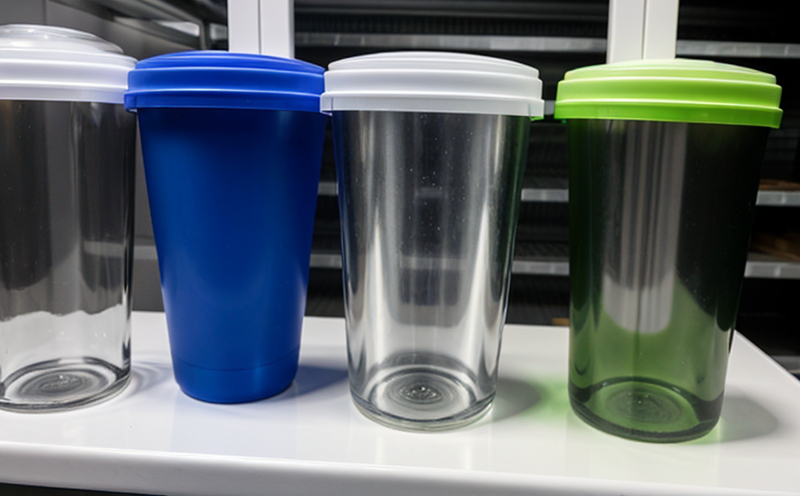ISO 4802-6 Glass Load Bearing Capacity
The ISO 4802 series of standards provides a comprehensive framework for testing glass containers, and specifically, the ISO 4802-6 standard focuses on determining the load-bearing capacity of glass packaging. This test is essential in ensuring that glass containers can withstand the pressures they will encounter during production, handling, storage, and distribution without compromising structural integrity or safety.
The testing process involves carefully placing a specified weight onto the glass specimen to determine at what point it begins to deform or fail under load. The load is systematically increased until failure occurs. This method allows manufacturers and quality assurance teams to identify any weaknesses in their packaging design, ensuring that products are robust enough for market demands.
Understanding the load-bearing capacity of glass containers is critical because it directly impacts product safety and consumer confidence. For instance, a glass bottle designed to hold carbonated beverages must be able to withstand internal pressure without bursting during transportation or storage. This test ensures that such requirements are met, thereby protecting both products and consumers.
Another important aspect of ISO 4802-6 is its role in compliance with international regulations. Many countries have laws requiring manufacturers to demonstrate the safety and integrity of glass packaging. By adhering to this standard, companies can ensure they meet these regulatory requirements, avoiding potential fines or recalls.
The testing procedure outlined in ISO 4802-6 is straightforward but requires precision. Specimens are typically cut from the same batch as those intended for production and are conditioned at specific temperature and humidity levels before testing begins. The load is applied gradually to prevent sudden failure, which could yield misleading results.
The apparatus used in this test includes a hydraulic or pneumatic testing machine capable of applying controlled loads to the specimen. Sensors measure the force applied and any displacement or deformation observed during the test. After reaching the point of failure, detailed measurements are taken to analyze how the glass responded under load.
Acceptance criteria for passing this test vary depending on the type of glass container being tested and its intended use. For example, a wine bottle must be able to withstand higher internal pressure than a soft drink bottle due to the nature of the contents. Compliance with these criteria ensures that all glass containers are safe and reliable.
One key advantage of ISO 4802-6 is its ability to provide valuable insights into the design process for new products. By identifying points at which failure occurs, engineers can refine their designs, leading to more efficient production processes and potentially cost savings. Additionally, this test helps in optimizing material usage, reducing waste while maintaining product integrity.
The results of ISO 4802-6 testing are crucial for various stakeholders involved in the glass packaging industry. Quality managers use these data points to ensure that their products meet internal quality standards and external regulatory requirements. Compliance officers rely on this information to stay ahead of changing regulations and market expectations. R&D engineers leverage test findings to innovate, improving existing designs or creating entirely new types of glass containers.
For procurement teams, knowing the load-bearing capacity specifications helps in selecting suppliers who can provide reliable packaging solutions. This knowledge also aids in negotiating contracts based on performance guarantees rather than just price points.
Customer Impact and Satisfaction
- Enhanced Safety: By ensuring glass containers can withstand the necessary loads, this test reduces the risk of accidents or injuries caused by container failure.
- Increased Consumer Trust: Compliance with international standards like ISO 4802-6 builds confidence among consumers who know their products meet high safety and quality benchmarks.
- Improved Product Reliability: Testing helps identify weak points in the design, allowing manufacturers to make necessary adjustments before product release.
- Regulatory Compliance: Adherence to this standard ensures that glass packaging meets legal requirements, avoiding potential penalties or recalls.
Competitive Advantage and Market Impact
Adopting ISO 4802-6 testing offers significant competitive advantages. First, it enables companies to innovate faster by identifying issues early in the design process. Second, consistent quality ensures that products are reliable across different markets, making them attractive to international buyers. Third, compliance with this standard can differentiate a brand from competitors, enhancing its reputation and market position.
Moreover, regular testing demonstrates a commitment to excellence, which is crucial for maintaining long-term relationships with customers and partners. It also opens doors to new business opportunities by aligning with industry trends and consumer expectations.
Use Cases and Application Examples
The use cases for ISO 4802-6 testing are diverse, ranging from beverage containers like bottles and jugs to specialty glassware used in laboratories or households. For instance, a pharmaceutical company might test its glass vials to ensure they can handle the internal pressure of injectable medications safely. Similarly, a wine producer could use this test to verify that their glass bottles can maintain structural integrity during transport.
In addition to these examples, ISO 4802-6 testing is also applicable for glass packaging used in food and cosmetic industries where safety and quality are paramount. By ensuring that every batch meets the required load-bearing capacity, manufacturers can protect both their reputations and consumer health.





